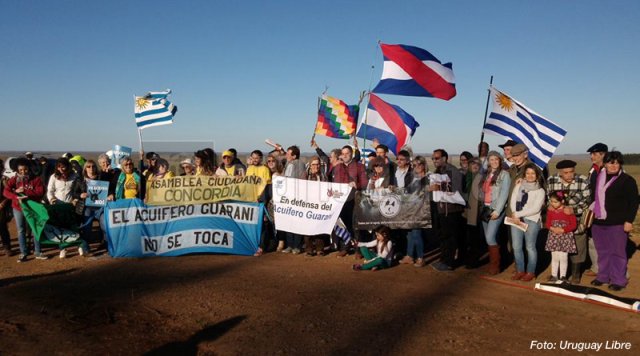
Environmentalists from Uruguay, Brazil, Argentina and Paraguay marched on August 5 in the department of Paysandu, Uruguay, to protest against oil and gas exploration being carried out by Australian company Petrel Energy. The company’s exploratory works, and potential exploitation, threaten the integrity of the Guarani Aquifer, one of the world’s largest deposits of groundwater.
Since 2013, Petrel Energy has been the majority shareholder in the US company, Shues
pbach, which has a 30-year contract to explore and exploit conventional and non-conventional hydrocarbons in the area.
Protest groups released the following statement on the day of the protest. It has been translated by Federico Fuentes.
***
We are gathered here in Cuchilla del Fuego, in the department of Paysandu, Uruguay, because the Guarani Aquifer system is being assaulted by perforations being carried out by an oil company and is under threat from the chemical and radioactive pollution that could arise from these activities.
The Guarani Aquifer, which is shared by Argentina, Brazil, Paraguay and Uruguay, is one of the biggest reserves of fresh water and the largest in the region.
It holds enough water to supply the entire world’s population with water for 200 years. With only 3% of the Earth’s water being fresh water, humanity’s access to fresh water has declined dramatically due to overexploitation and human contamination.
The problem began in 2012 when Ancap [Uruguay’s state oil company] signed a 30-year contract with US company Schuepbach, which since late 2013 has been controlled by Australian company and majority shareholder Petrel Energy, to explore and exploit conventional and non-conventional hydrocarbons, that is, fracking.
The company was given these concessions in complete secrecy, denying Uruguayans the possibility of attending public hearings where they could inform themselves and raise their doubts and opinions.
It was necessary to appeal to the court to discover the content of these contracts.
Many neighbours in this area have observed, at different times and places, thunderous vibrations of a magnitude they had never known before. According to experts from the geophysical laboratory of Uruguay, their seismographs have not registered these events.
The origins of the vibrations have been attributed to vibrations and explosions in quarries, which has only generated even more concerns.
There is also concern about what will happen with the land that is dug up, given that it has been classified by officials as innocuous on some occasions, and as toxic on others. In fact, according to the summary environmental report presented by the company to DINAMA [the National Director of the Environment], it contains hazardous residues that require special treatment and disposal.
We request that drilling be stopped until there is accurate information, in line with environmental authorisation guidelines, and the necessary preventive measures are taken.
Faced with the lack of official information and confusing statements from some officials, we have sought information about this oil venture. According to our sources, the probability of the existence of conventional oil in Uruguay is close to zero and the business that lies behind the oil that there is not is really a financial manoeuvre that seeks to artificially inflate share prices.
We are next to the Cerro Padilla well, which is the first of the four that are planned.
DINAMA has given the go ahead for these perforations, despite reports from specialists warning about the dangers of drilling in the Tacuarembo, Yaguari and Tres Islas aquifers, which make up the Guarani Aquifer.
These reports warn DINAMA that it should have taken into account the geomorphologic characteristics that make it dangerous to continue drilling, especially in the one that is so close to Salto Grande dam, a very deep excavation, given that drilling on a fault line can generate seismic movements with potentially serious consequences given it is so close to such a large concentration of water.
We need a law prohibiting fracking in Uruguay before it's too late. Today, the exploitation of hydrocarbons via hydraulic fracturing jeopardises Uruguay’s greater wealth, its land and water, and is incompatible with other areas of production and life itself.
Recently, at the Mendoza Summit [a people’s summit held in parallel to the Common Market of the South (Mercosur) heads of state summit], it was said that it is time to reactivate Mercosur. How timely it would be that, as part of realising this goal, we included the preservation of our natural commons such as the Guarani Aquifer System.
We hope that the leaders of our four countries will stop thinking so much about the next elections, and act decisively as statespersons, thinking about our next generations.
We are determined to continued mobilising until these activities stop. For life, let’s defend the Guarani Aquifer.